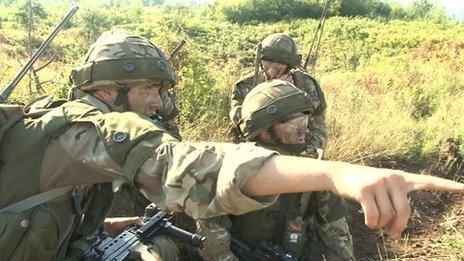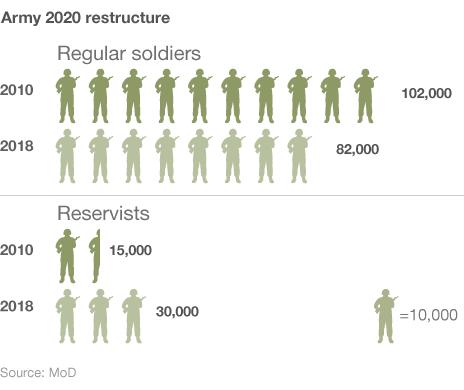Army reserve row: Rebel MPs defeated over restructuring
- Published

Some Tories fear there will not be enough reservists to fill gaps left by cuts
The government has defeated an attempt by rebel Conservative MPs to delay moves to reorganise the Army.
John Baron MP had tabled an amendment to the coalition's bill, saying MPs must "re-examine" plans to recruit more reservists to replace regular soldiers.
But Defence Secretary Philip Hammond said delays to the plan risked "serious damage" to the UK's reserve forces.
Mr Baron's proposal was defeated in the Commons by 306 votes to 252, a government majority of 54.
The amendment to the Defence Reform Bill aimed to give both peers and MPs the power to block the government's proposals, which entail expanding the size of the Army Reserve, formerly known as the Territorial Army, to 30,000 from 19,000 now - while reducing the regular force by 20,000 by 2020.
In an effort to head off the rebellion, the government earlier agreed to update MPs every year on the strength of the military reserves.
The concession came as MPs raised concerns that a target to recruit 10,000 Army Reserve recruits would not be met.
'Political football'
Up to 20 Tory MPs backed the call by Mr Baron - a former soldier - for a delay ahead of the vote.
"I think it's not unwise to say pause for a brief moment and let Parliament properly scrutinise these plans," he had argued.
But Mr Hammond had told MPs any delay to the legislation would send a "negative signal" to reservists.
"The government has set out its plan. We are legislating to deliver it. The Army has embraced it wholeheartedly," he said.
"For Parliament to introduce additional trip wires at this stage would create uncertainty, undermine the message about rollout of improved terms and conditions and cast doubt about our intention to spend the sizeable sum of money - the £1.8bn - that we have available to support this agenda.
"In short, it would make the whole agenda into a political football."

There are currently 19,000 trained reservists
But ahead of the vote Mr Hammond said The Reserve Forces and Cadets Associations would provide annual information to Parliament on recruitment and retention in the reserves.
He told MPs that "on reflection we consider that is a sensible idea and will strengthen the programme for the growth and reinvigoration of our reserves".
In the end, nine Conservative backbenchers voted against the government, with two tellers, external also supporting the rebel amendment.
The BBC News channel's chief political correspondent Norman Smith said that potential rebels had been persuaded to back the government, partly because of the annual recruitment report proposal.
But they also were genuinely concerned that the rebel amendment could have compromised the ability of armed forces to operate as effectively as Mr Hammond said they needed to, our correspondent added.
- Published3 July 2013
- Published19 November 2013
- Published5 November 2013
- Published27 October 2013
- Published25 October 2013
- Published11 September 2013
- Published12 May 2013